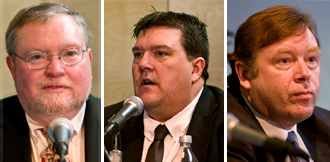Symposium Explores Paths to Commercialization
For the 17th Burkenroad Symposium on Business and Society, three nationally respected experts in the areas of nanotechnology, alternative energy and regenerative medicine offered their thoughts on what it takes to bring cutting-edge technologies to market.

Commercializing new technologies is a familiar topic for Burkenroad Institute symposium speakers Thomas Clarkson, left, David Carroll, center, and Stephen Conners, right. (Photos by Darryl Glade)
The symposium, an annual presentation of the Burkenroad Institute, took place on Friday (Feb. 26) in the Lavin-Bernick Center. Laura B. Cardinal, Exxon Professor of Strategy and director of the institute, moderated the event. The institute is part of the A. B. Freeman School of Business.
David L. Carroll, director of the Center for Nanotechnology and Molecular Materials at Wake Forest University, has spun off successful companies from technologies developed at the center.
"Typically speaking, the technology you're trying to spin off does workit's been vetted, it's been published, it's been patented," Carroll said. "[The challenge is] getting the management team together and realizing that what you're trying to do is to develop a product and aim it squarely at a marketplace."
Stephen R. Connors, director of the Analysis Group for Regional Energy Alternatives at Massachusetts Institute of Technology, emphasized the importance of focusing on market dynamics rather than the technology in isolation.
"Snake oil is not a biofuel," he quipped. "The basic chemical process may be right, but that doesn't mean it's a business, let alone an industry. As you evaluate some pitch for a novel energy technology that's going to give you some competitive edge, what's the market niche?"
Thomas B. Clarkson, director of planning and business development at the Institute of Regenerative Medicine of Wake Forest University, discussed the institute's unique approach to commercializing technologies.
At Wake Forest, an internal organization focuses on clinical trials while an external group focuses on management, business issues and funding.
"When you move programs through the different steps of clinical trials by having two cooperating organizations, you can be more efficient at bringing technologies to market," he said.
Mark Miester is the editor of Freeman magazine for the A. B. Freeman School of Business.
